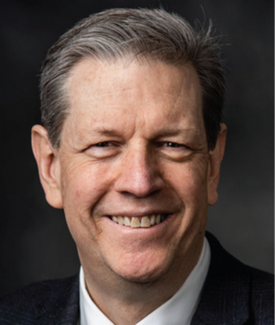What's New > Q&A with Jon Skidmore
 |
Jon Skidmore
|
Dr. Jon Skidmore, Psy.D., is presenting “The Technology of Peak Performance” and “Conquer Stage Fright: Perform with Confidence” at the 2023 NATS Winter Workshop in Miami, January 6-8.
So glad you are joining us for the 2023 NATS Winter Workshop. Tell us a little about yourself, and give us a quick overview of Peak Performance.
I grew up in a musical family. My mother was an accomplished musician, and my father was a psychologist. Singing solos at school programs, playing the trumpet in the band, having leads in musicals, voice lessons and singing in a wide range of choirs were all part of my school experience from elementary to graduate school. I was even the lead singer in a rock band for two weeks in 5th grade. I attended college with a vocal scholarship as I finished my degree in psychology. While completing a master’s degree in counseling at Brigham Young University, I had the privilege of singing with University Singers under the direction of Ron Staheli. While singing with this amazing group, I saw how the tools and skills of performance psychology were missing in my life and the training of most musicians. I began sharing what I was learning with the members of Singers. They nicked named me Dr. Stress. I have been teaching performing artists ever since. I went on to get my doctoral degree in clinical psychology and my dissertation was a study into the experience of the peak performance with musicians. After finishing my degree, an employment opportunity took me to Provo, Utah, and it wasn't long before I was teaching the Psychology of Music Performance at BYU. This class has been an amazing place to bring so many ideas together to help musicians step out on stage with confidence and ease. The work I am currently doing as a performance psychologist utilizes my experience as a singer, educator, researcher and clinical psychologist. I feel privileged to help performing artists from around the world find freedom on stage and in life.
When you asked for a quick overview of the peak performance the word “play” came to mind. The characteristics of a peak performance match the characteristics of a child playing at a playground. Unfortunately, for most musicians as they get “trained,” they lose the sense of play and wonder, and replace it with the expectation of perfection. How fun could going down the slide be if all you could focus on was sliding with the right technique? It's rewarding to see a musician drop the stress and expectations and once again reclaim the joy of playing on stage. When I did my doctoral dissertation on the peak performance, the field of psychology was just beginning to understand the experience of flow. Today with the advances in technology, we understand the neuropsychology of flow. It’s not a mystery, it’s brain science. It is exciting to be able to teach performers the psychological tools and skills that enable them step out of stage fright and step into flow.
That’s great. So, roughly how common is performance-related anxiety?
How common is performance anxiety? Very common. Everyone is wired for the potential of performance anxiety. Each of us has a part of the brain that was fully developed by the time we were two, known as the amygdala — the fight or flight response. As soon as a child learns that any kind of failure or disappointment can cause physical or emotional pain, it is remembered in the amygdala as a danger. The stress response is perfect for an encounter with a rattlesnake and not so good when triggered by the thought of an audition or a mistake on stage. I believe that every performer needs to have a solid understanding of the mechanics of the stress response and the research-based strategies that effectively manage the physiological and the psychological experience of performance anxiety. Unfortunately, I've seen performers, pre-performance desperately eating bananas believing that there was something in the banana that would prevent them from getting stage fright. It's a myth. I asked a group of music teachers what they do to help their students with performance anxiety? A teacher shared how she recommends eating bananas and that it is effective. “Except for the boy that ate four bananas and then threw up.” That poor boy, the victim of misinformation.
When performers understand that their stress response has been activated and they know what to do to manage it, they're no longer afraid of it. They focus on singing and their anxiety goes away. If they focus on being anxious, they get more anxious. Stage fright is not a disease — it is a skill deficit.
Since we’re talking all about tech at the workshop, how does technology intersect with calming one’s mind and dealing with stage fright?
It’s exciting to see just how much information is so readily accessible that can help a performer calm their body and quiet their mind. For example: YouTube is filled with excellent relaxation, meditation and visualization tools for performers. There are apps that have wonderful tools ready to make a difference with anxiety, if you practice them! Other ways in which technology is making a difference focuses on biofeedback and EEG neurofeedback. With biofeedback, technology is being used to read the signals of stress from the body and share them with us so we can become aware and then train ourselves to relax. EEG neurofeedback helps performers train the brain for peak performance.
That sounds fascinating! Can you give us past examples of performers who have overcome their struggles using your guidance and tools?
In class one night I was sharing a module on understanding our personal story, the script we follow that tells us how to navigate the twists and turns of life. A student raised her hand and asked if this could be why she quit singing. She told the following story. She was 14 years old and had been invited to sing a solo in church. Her best friend, also 14, was going to accompany her. They gladly accepted this invitation. They prepared well. When Sunday morning arrived, they were at church ready to perform! At the appropriate time, they moved to the front of the congregation. The accompanist started playing, the singer came in and everything was flowing beautifully. Until, for whatever reason, the accompanist stopped playing. These two young musicians panicked. Overcome with anxiety, they didn't know what else to do so they returned to their seats. She left the church that morning a non-singer. Sadly, she had not sung in public in the past six years. Two weeks later as class was starting, she raised her hand and proudly announced, “Dr. Skidmore, I just wanted you to know that I sang a solo in church on Sunday!” The class cheered. The power of awareness, tools and grit!
On the first day of class, I have each student share why they are taking my performance psychology class. An experienced and accomplished pianist shared that for her “performing had become the cruelest form of torture.” And she meant it! The joy of music had been replaced by extreme fear and dread. She made it clear that unless something changed, her future in music would end. Halfway through the semester she had a smile on her face as she described playing for her master class and enjoying it. She had fun, and she had even made a few mistakes. This was a breakthrough!
A 10-year-old girl had recently completed my Musician’s Path to Peak Performance program. She had an audition with a nationally known a capella group. After her audition, she shared how she saw just how “activated” all the other auditioners were and that she used to be just as nervous as they were. She was smiling as she talked about being a little “activated,” but she knew what to do about it. She won that audition.
After attending a workshop, a Junior-High-School-aged trumpet player said, “I can try out for the jazz band now.”
Wow, so do you recommend attendees do any pre-reading or pre-work before the workshop?
Read my book and take my performance assessment:
In chapter 2 of my book, “Conquer Anxiety: How to Overcome Anxiety and Optimize Your Performance,” there is a performance assessment. The four exercises will help you clarify your goals and identify your psychological performance strengths and weakness. You might even find what is the root cause of your performance anxiety.
Also on my website jonskidmore.com, there are free video tools and a self-scoring Performance Profile that you can enjoy.
- From Stage Fright to Flow: Tedx XuhuiSalon
- NATS Chat: March 14, 2022"Music Performance Anxiety (MPA): What Voice Teachers and Singers Need to Know" with Yvette Litchfield and Jon Skidmore, Psy.D
Anything else you would like to add about your sessions or the workshop?
My workshops are highly interactive. I am a learn-by-doing presenter. Come ready to volunteer and jump right out of your comfort zone.
Step up, Risk, Enjoy!
Thanks for answering our questions! We look forward to learning more in Miami.
Check out our video conversation with Jon Skidmore as well.
Don’t miss Jon Skidmore as he presents “The Technology of Peak Performance” and “Conquer Stage Fright: Perform with Confidence” along with our other presenters at the 2023 NATS Winter Workshop in Miami, January 6-8.
Save money by registering early. Early-bird deadline has been EXTENDED to Saturday, November 12, 2022 at 11:59 p.m. ET. ($249 NATS member rate; $279 after November 12). Don’t delay, register today!


